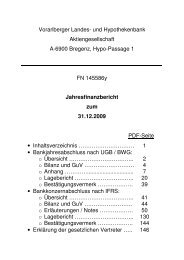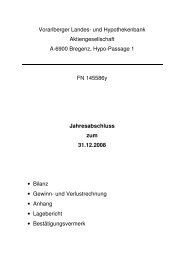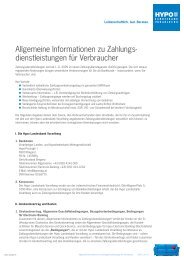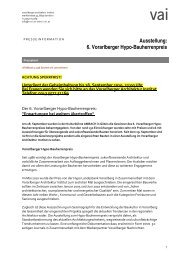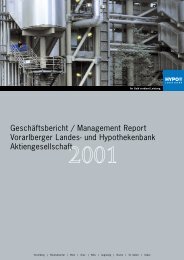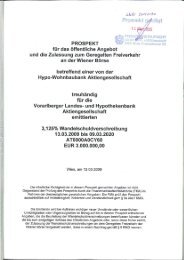Vorarlberger Landes- und Hypothekenbank Aktiengesellschaft
Vorarlberger Landes- und Hypothekenbank Aktiengesellschaft
Vorarlberger Landes- und Hypothekenbank Aktiengesellschaft
You also want an ePaper? Increase the reach of your titles
YUMPU automatically turns print PDFs into web optimized ePapers that Google loves.
39<br />
instruments unless it has the expertise (either alone or with a financial adviser) to evaluate how the Notes<br />
will perform <strong>und</strong>er changing conditions, the resulting effects on the value of the Notes and the impact this<br />
investment will have on the potential investor's overall investment portfolio.<br />
Liquidity Risk<br />
Application has been made to list and trade Notes in bearer form to be issued <strong>und</strong>er the Programme on<br />
the regulated market of the Luxembourg Stock Exchange (Regulated Market "Bourse de Luxembourg").<br />
In addition, the Programme provides that Notes may be listed on an alternative stock exchange or may not<br />
be listed at all. Regardless of whether the Notes are listed or not, there can be no assurance that a liquid<br />
secondary market for the Notes will develop or, if it does develop, that it will continue. The fact that the<br />
Notes may be listed does not necessarily lead to greater liquidity as compared to unlisted Notes. If the<br />
Notes are not listed on any stock exchange, pricing information for such Notes may, however, be more<br />
difficult to obtain which may affect the liquidity of the Notes adversely. In an illiquid market, an investor<br />
might not be able to sell his Notes at any time at fair market prices. The possibility to sell the Notes might<br />
additionally be restricted by country specific reasons.<br />
Market Price Risk<br />
The development of market prices of the Notes depends on various factors, such as changes of market<br />
interest rate levels, the policy of central banks, overall economic developments, inflation rates or the lack<br />
of or excess demand for the relevant type of Note. The holder of Notes is therefore exposed to the risk of<br />
an unfavourable development of market prices of its Notes which materialises if the holder sells the Notes<br />
prior to the final maturity of such Notes. If the holder decides to hold the Notes until final maturity the Notes<br />
will be redeemed at the amount set out in the relevant Final Terms.<br />
Risk of Early Redemption<br />
The applicable Final Terms will indicate whether an Issuer may have the right to call the Notes prior to<br />
maturity (optional call right) on one or several dates determined beforehand or whether the Notes will be<br />
subject to early redemption upon the occurrence of an event specified in the applicable Final Terms (early<br />
redemption event). In addition, each Issuer will always have the right to redeem the Notes if the Issuer is<br />
required to pay additional amounts (gross-up payments) on the Notes for reasons of taxation as set out in<br />
the Terms and Conditions. If the Issuer redeems the Notes prior to maturity or the Notes are subject to<br />
early redemption due to an early redemption event, a holder of such Notes is exposed to the risk that due<br />
to such early redemption his investment will have a lower than expected yield. The Issuer can be expected<br />
to exercise his optional call right if the yield on comparable Notes in the capital market has fallen which<br />
means that the investor may only be able to reinvest the redemption proceeds in comparable Notes with a<br />
lower yield. On the other hand, the Issuer can be expected not to exercise his optional call right if the yield<br />
on comparable Notes in the capital market has increased. In this event an investor will not be able to<br />
reinvest the redemption proceeds in comparable Notes with a higher yield. It should be noted, however,<br />
that the Issuer may exercise any optional call right irrespective of market interest rates on a call date.<br />
Currency Risk/Dual Currency Notes<br />
A holder of Notes denominated in a foreign currency and a holder of Dual Currency Notes is exposed to<br />
the risk of changes in currency exchange rates which may affect the yield of such Notes. Changes in<br />
currency exchange rates result from various factors such as macro-economic factors, speculative<br />
transactions and interventions by central banks and governments.<br />
A change in the value of any currency other than euro against the euro, for example, will result in a<br />
corresponding change in the euro value of Notes denominated in a currency other than euro and a<br />
corresponding change in the euro value of interest and principal payments made in a currency other than<br />
in euro in accordance with the terms of such Notes. If the <strong>und</strong>erlying exchange rate falls and the value of<br />
the euro correspondingly rises, the price of the Notes and the value of interest and principal payments<br />
made there<strong>und</strong>er expressed in euro falls.<br />
In addition, government and monetary authorities may impose (as some have done in the past) exchange<br />
controls that could adversely affect an applicable currency exchange rate. As a result, investors may<br />
receive less interest or principal than expected, or no interest or principal.



